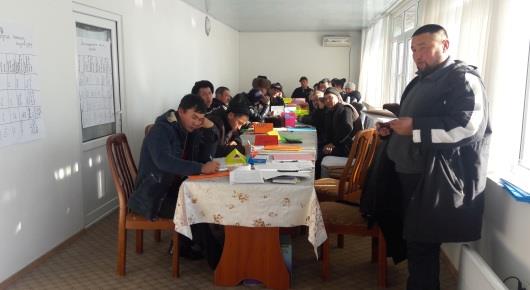Kyrgyzstan makes gains towards profitable aquaculture sector

As a landlocked country infused with rivers, springs and freshwater lakes, including the world’s second-largest high-mountain lake, Issyk-Kul, the Kyrgyz Republic has an abundance of freshwater resources for aquaculture. Having realized this, the country has been making its path, with the help of FAO, to develop this to a full-scale industry.
A recent FAO training aimed at equipping 120 fish farmers – members of the Kyrgyz Association of Fish Farmers – with the necessary business skills to run a profitable fish farm.
The country has good, although underutilized, potential in fish farming, especially in the production of common carp, grass carp, silver carp and rainbow trout in some cold water areas.
Kyrgyzstan started collaborating with FAO on aquaculture in 2009, with the help of funding provided by the Government of Finland.
Several improvements have been made since then: Aquaculture farmers’ associations have been established, four small-scale trout and carp hatcheries were built to supply fingerlings, and three feed mills were constructed to make affordable and nutritious feed available to the small-scale farmers.
The facilities are now operational, and fish production has started, but improvements could be made regarding farmers’ technical knowledge of managing the hatcheries and feed mills, as well as basics of fish farming. Therefore, the three parties – Kyrgyzstan, Finland and FAO – have therefore agreed to extend the project for an additional two years (2018–2019) to ensure the sustainability of the earlier interventions.
In December 2017 and January 2018, three new courses were offered to beneficiaries in the northeastern Issyk-Kul and southern Jalal-Abad oblasts, covering seven thematic modules on business management and marketing over three days. Participants included 26 women farmers.
“The training was very productive; all topics and issues related to the development of agricultural business skills were covered,” said Asan Dzhapaev, chairman of the Tyup district fish farmers association. “It was especially interesting and useful for beginners and young entrepreneurs.”
FAO has worked with a Kyrgyz public foundation, Chui-Talas RAS, to develop training materials that match the needs of Kyrgyz fish farmers. Farmers have learned to work out a fish marketing strategy, to plan budgets and calculate costs that matched local conditions, including some basics on financial planning for small-scale businesses. Participants also have carried out a business efficiency analysis, calculating the time needed for the project to pay off – critical skills for farmers to operate their farms as economically viable entities.
The interactive trainings, using visual tools and demonstration methods, were well-received by the farmers. Participants noted that they gained a lot of new information that they could use to improve their business skills and financial literacy.
12 April 2018, Bishkek, Kyrgyzstan
